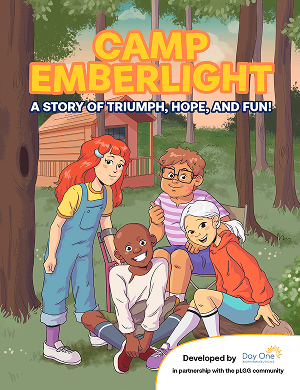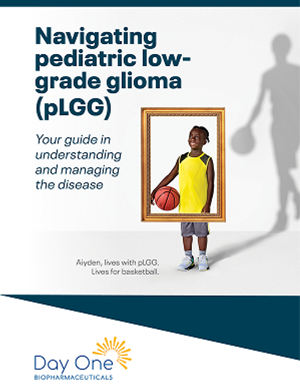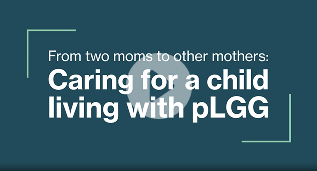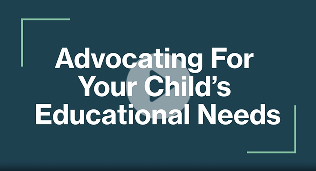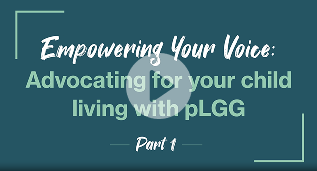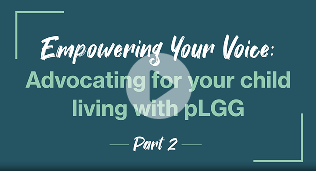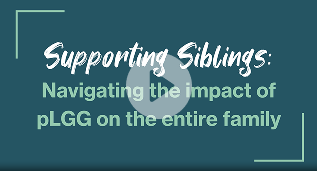Resources
Helpful resources, support, and community available at every step
Lily, lives with pLGG, and her family.
Explore Resources—Find educational webinars and community support here
Resources

Doctor Discussion Guide
A helpful tool to start the conversation about pLGG and treatment planning
Download Discussion Guide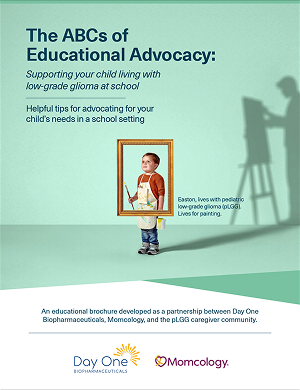
The ABCs of Educational Advocacy: Supporting your child living with low-grade = slow growing glioma = a certain type of brain tumor at school
Download Brochure
A deep dive into pLGG
Educate your child, your family, and yourself on how the biology of BRAF = a gene that, when altered, may be a driver of pLGG growth-driven pLGG may inform treatment planning
Watch VideoWebinars
Connecting with people going through the same experiences can be a great source of comfort and knowledge.
A few patient organizations include*:
Some of these groups run private social media groups for families with children living with pLGG on platforms like Facebook.
Building connections with families who have done this before and talking in a safe space can be helpful, especially in knowing you are not alone.
*This is not a comprehensive list of resources and is provided for reference only.
Knowing who's on your care team
Each member of your team is here to support you and your family as best as possible. So let them know what that looks like for your child. If you need something, speak up. Communication is key, as you are all in this together.
Oncologist
Doctor who diagnoses and treats cancer and tumors
Child life specialist
Healthcare worker who helps families cope with health challenges
Surgeon
Doctor who performs surgery
Radiologist
Doctor who specializes in MRIs, X-rays, and other imaging procedures used to diagnose and monitor tumor growth
Pathologist
Doctor who examines tumor tissue
Nurse
Healthcare worker who cares for patients under doctor supervision
Pharmacist
Healthcare worker who makes sure medications are being prescribed appropriately
Other team members may include:
Pediatric neuro-oncology team, neurosurgeon, family pediatrician, ophthalmologist, audiologist, psychologist, therapist, endocrinologist, physical therapist, occupational therapist, speech pathologist, social worker, teacher, school administrator, and transition education specialist
Glossary
Alteration = a type of genomic change (mutation or fusion) in the BRAF gene that may contribute to cancer development
Biopsy = sample of tissue collected for analysis under a microscope and/or for comprehensive genomic testing
BRAF = a gene that, when altered, may be a driver of pLGG growth
BRAF fusion = 1 of the 2 most common types of BRAF alterations in pLGG (eg, KIAA1549-BRAF fusion)
BRAF inhibitor = type of targeted therapy that works on the BRAF protein to inhibit or slow the growth of tumor cells
BRAF point mutation = 1 of the 2 most common types of BRAF alterations in pLGG (eg, BRAF V600E)
FDA approval = treatment has been tested in clinical trials and approved by the US Food and Drug Administration
Genomic testing = sometimes referred to as genetic testing, and used to identify types of alterations in genes including those in BRAF
Glioma = a certain type of brain tumor
Grade 1 = low-grade tumor
Grade 2 = low-grade tumor
Low grade = slow growing
MEK inhibitor = a type of targeted therapy that works on the MEK protein to inhibit or slow the growth of tumor cells
Targeted therapy = type of treatment that targets and attacks tumor cells with certain characteristics
Your care team and your pLGG community members are important resources for support.
